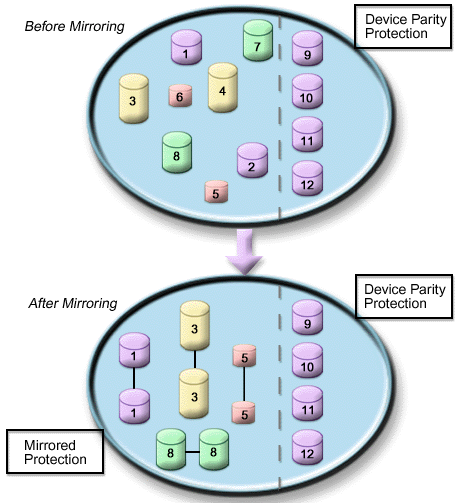- Mirrored protection and device parity protection to protect the system disk pool
- Mirrored protection in the system disk pool and device parity protection in the user disk pools
- Mirrored protection and device parity protection in all disk pools
Mirrored protection and device parity protection to protect the system disk pool
Here is an example of a system with a single
disk pool (auxiliary storage pool) with both mirrored protection and device
parity protection. 
The figure shows a single disk pool with twelve disk units. Disk units 9-12 all have the same capacity and are protected by device parity protection. Disk units 1-8 have varying capacities, but each disk unit can be paired with another disk unit of the same capacity when mirrored protection is started. After mirrored protection is started, the disk units that have been paired together are both identified by the same number. Disk units 1 and 2 are now both named 1, and so forth. The system will fail if more than one disk unit fails for RAID 5 or more than two disk units fail for RAID 6. The failed unit can be repaired concurrently. If one of the mirrored disk units fails, the system continues to run using the operational unit of the mirrored pair.
Mirrored protection in the system disk pool and device parity protection in the user disk pools
Consider device parity protection if you have mirrored protection in the system disk pool and you are going to create basic or independent disk pools. RAID 5 allows for the system to tolerate a failure in one of the disk units in a basic or independent disk pool. RAID 6 allows for the system to tolerate a failure in two disk units. The failure can be repaired while the system continues to run.
Mirrored protection and device parity protection in all disk pools
If you have all disk pools (also known as auxiliary storage pools) protected with mirrored protection and you want to add units to the existing disk pools, consider using device parity protection as well. RAID 5, the system can tolerate a failure in one of the disk units with device parity protection. RAID 6, the system can tolerate two disk unit failures. The failed units can be repaired while the system continues to run. If a failure occurs on a disk unit that has mirrored protection, the system continues to run using the operational unit of the mirrored pair.